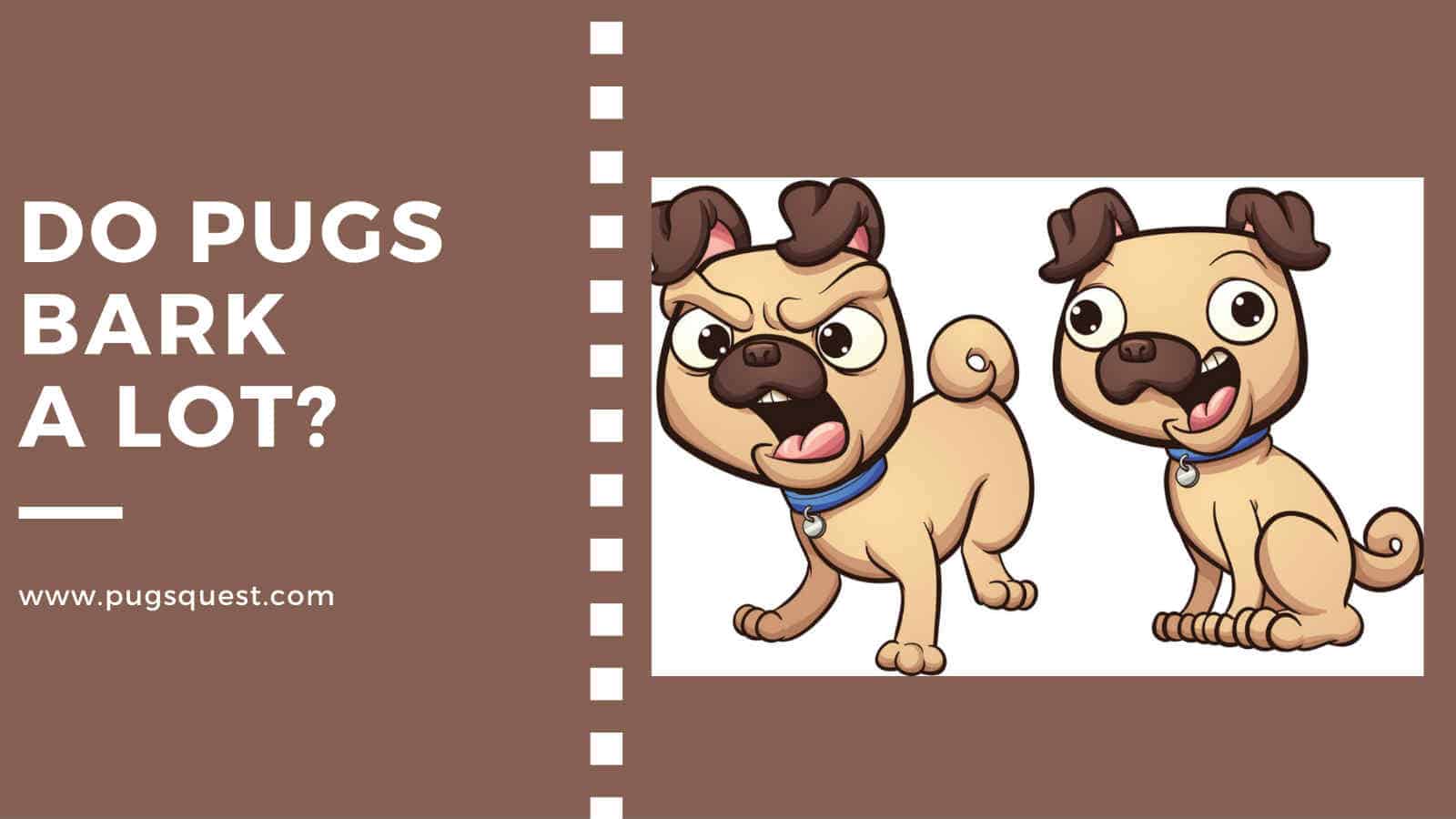You might be worried about Pug barking when you consider getting a Pug. Perhaps you have a child at home, close neighbors, or a pooch that just won’t zip it.
In this article, I’ll discover do Pugs bark a lot and unveil some top tips for managing your Pug’s vocal cords. Peace of mind and happy neighbors guaranteed.
Do Pugs Bark and How Much?
Yes, Pugs do bark. It is their means of communication. But if you’re looking for a dog that ranks low on the bark-o-meter, a Pug might actually be the best option for you.
Though Pugs bark, it is usually quite minimal. It’s important to remember that every Pug will have its own unique personality. But, in general, Pugs are quiet, laid back animals.
Compared to most other breeds, Pugs don’t bark very much at all, making them ideal indoor pets for apartment dwellers.
A Pug uses their bark to protect their humans from danger. So expect a woof, yap, and occasional howl from time to time.
This is your Pug trying to tell you something very important (at least they think so).
Barking is a natural response for any dog. The best way to prevent your Pug from barking a lot is to start training them whilst they are still a puppy.
What Does A Pug’s Bark Sound Like?
Pugs are a small but broad dog. That means their bark is neither overly loud nor too high in pitch. But the Pugs’ voice is very unique and their bark is known for its distinctiveness.
In fact, many Pug owners grow to love their Pug’s vocal repertoire. With noises ranging from cute to plain-old obscure, a Pug offers endless entertainment in one tiny package.
Pug owners often describe these noises as mid-range squeals, whines, howls, and whimpers.
Take a look at this video where you’ll be taken through the Pugs’ full vocal range.
Why Do Pugs Bark?
All dogs bark. This is a completely natural response to external stimuli. Whether you’ve got yourself a barker, or a yelper, there are many situations that could trigger this response.
We often think of a dog’s bark as a sign of threat. Guard dogs barking at the postman is an image that commonly springs to mind.
But a dog’s bark can also indicate curiosity and excitement.
In other words, it’s playtime!
Pugs are not guard dogs. But there are many factors that might cause them to start vocalizing. Remember they are just reacting to their immediate surroundings.
Pugs are loving, protective animals and their bark is very rarely a sign of aggression. In fact, most of the time a Pug’s barking spree lasts only a few moments.
Let’s discuss why Pugs bark and some of the most common barking triggers.
1. Communication
Pugs were bred as companion dogs. That means they love people.
But for better or for worse, Pug can’t speak. Barking is their version of communication.
Talk to any Pug owner and they’ll swear their dog talks to them. One of the joys of owning a Pug is getting to know their unique language.
Your Pug might be trying to get your attention. Perhaps they think it’s about time for a walk or a tasty snack.
Pugs are little divas at heart. If you’re late with dinner, or if walkies are overdue, expect a bark or yap as a way of a reminder.
2. Protectiveness
Pugs are loyal to their humans above anything else. They use their bark to try and protect you. You might not see the postman as a threat, but your Pug doesn’t know that.
Pugs are territorial over their home and family. Barking is often a warning defense against perceived threats to their nearest and dearest.
Remember that Pugs have excellent hearing. They might have heard something that you’re not even aware of.
Other signs that your Pug might be feeling protective include a change in posture, with ears forward and head held high.
By socializing your Pug early, they will develop a tolerance to everyday occurrences (like the postman) and learn that there’s nothing to be afraid of.
3. Boredom
Pugs may be sedate animals, but they need regular activities to keep their mind and body active. If your Pug is barking more than usual, they might just be a bit bored.
Make sure they have lots of fun toys to while away the hours at home. And don’t forget to prioritize short, daily walks and time for cuddles and companionship.
Barking is a release of all that pent-up energy. Your Pug is trying to connect with other dogs or people in the only way they know.
4. Excitement
Your pooch might just be super excited.
Barking isn’t always a sign of something bad. Perhaps you’ve been out at work all day and just walked through the door. Perhaps you’re getting ready for walkies.
Your Pug might be barking because they’re brimming with happiness!
Remember Pugs are companion dogs are you are their best friend. They’ve missed you.
Their uncontrollable excitement is a sign of love. But it is possible to train a Pug to react more calmly in situations such as these.
5. Separation Anxiety
Because our Pugs grow so attached to us, they can sometimes struggle with separation anxiety. Barking is their way of telling us they don’t want us to leave, or trying to get us to come back home.
Try not to leave your Pug in isolation for long periods of time. If you do have to go out, make sure there are plenty of toys around to keep them busy, or try and rope in friends and family for some dog-sitting.
6. Illness
It can be difficult for our pooches to let us know when they are feeling poorly. Barking is sometimes a sign of health problems or pain.
Barking could signal cognitive dysfunction (deafness). Since they cannot hear themselves, your Pug will bark more than they typically would.
If your Pug shows signs of reduced mobility or seems otherwise unwell, barking or yelping might be their way of asking for help.
This is a sign that it’s time to visit the vet.
7. Sudden noises
Pugs react to some noises by barking. High-pitched sounds in particular are well known to induce a Pug-based frenzy from time to time.
Everything from doorbells and vacuums, to TVs, sirens, or fireworks could be enough to set off your pooch.
Remember, Pugs have far better hearing than us so these sounds are even more intolerable to them than they are to us.
How Can I Make My Pugs Stop Barking
Though not all Pug owners want to, it is possible to train a Pug to stop barking (or stop barking excessively). The key to success is starting at an early age.
Start by discerning what it is that is causing your Pug to bark.
Never punish your Pug for barking. They will not understand. Instead, try to remain patient. The best training method for Pugs is positive reinforcement(internal linking to “pug training”).
Top Tip: Never tell your Pug to stop barking without a potential reward to follow. Your Pug will just think that you are barking at them.
So how can we stop our Pugs from chatting too much?
We recommend a three-pronged approach to training.
Stop. Command. Reward.
Each time your Pug barks, tell them to stop with a clear command. Employ this command consistently and reward them with treats and plenty of affection when they stop barking.
Patience is the magic ingredient. But if your Pug is being particularly stubborn, why not try one of these great tricks.
1. Distraction
Distract a barking Pug with something more exciting to do. A favorite toy or game for example.
2. Opposite training
Use this time to train your dog to speak on command. This will teach them when to be quiet by default.
FAQ
1. When do Pugs start to bark?
Pugs start barking a few weeks after they are born. This is usually between 2-3 weeks of age but can be longer depending on the individual dog.
2. Do Black Pugs Bark as much as Fawn Pugs?
Yes. All Pugs bark no matter their coloring. Some Pugs will bark more than others but this is down to personality, environment, and training. Not their coat.
3. Should I use a shock collar on my dog?
We do not advise the use of a training color (or shock color) on your Pug. If you are experiencing great difficulty with your Pug’s barking, then invest in a professional training course worth trying.
Do Pugs Bark A Lot: Last Words
I hope you’re now equipped with all the tools you need to get that Pug barking under control.
There are many reasons why Pugs bark.
Start by getting to know your pet’s triggers and work from there.

